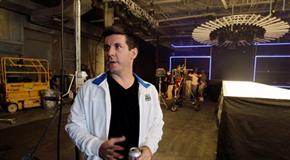Features
Miami Director’s Hustle Hooks Lil Wayne, Pitbull
Growing up in the 1980s in Little Havana, Rousseau couldn’t afford to attend the big concerts happening blocks away, including Bruce Springsteen, Michael Jackson, Pink Floyd and Genesis. But he was set on a path to his present-day career by imagining his own videos for the music spilling out of the stadium.
“I would literally sit on top of one of the cars in the neighborhood and listen. You’re hearing the music and you’re trying to figure out what’s going on in there. That’s where you start visualizing the music,” said Rousseau, whose parents are Cubans who moved to Miami from Venezuela.

These days, the 35-year-old’s imagination spawns bright colors and graphics that accompany the music of artists including Lil Wayne, Enrique Iglesias, Pitbull, and T-Pain. Rousseau’s innovative – and often thrifty – approach has earned him repeat business from Pit Bull, as well as Lil Wayne’s label, Cash Money Records.
“He just know our swagger,” said Cash Money CEO and rapper Bryan “Birdman” Williams.
Rousseau’s expertise in creating visuals that pop out of people’s Web browsers has benefited him in recent years, as the primary venue for music videos has shifted from television to the Internet.
“When you’re watching things on TV and you have a wide shot and you see a vast vista, it’s beautiful,” Rousseau said. “But when you watch it on your phone or on YouTube, people look really tiny. Now you have to do more close-ups. You have to do more shots where the artist is full frame, centered in front of the screen.”
Still, Rousseau calls hours spent watching MTV his film school. As a child, he began making his own videos with his father’s Super 8 camera and later took TV production classes in high school. After graduating from South Florida’s Barry University with a communications degree in 1999, Rousseau got a job in the promotions department at Miami’s CBS affiliate, WFOR.
Rousseau eventually landed at the satellite and digital cable channel The Tube Music Network. He was working there in 2006 when a friend recommended his directing skills to rapper Pitbull.
“He was hungry,” Pitbull said. “He was like ‘Look, I’ll shoot this video for basically nothing. I just want to show you how I work.’ And sure enough, we did ‘Be Quiet’ in Little Haiti, and we haven’t stopped working since then.”
Rousseau has made 13 videos with Pitbull, including “I Know You Want Me (Calle Ocho),” which has received more than 150 million views on YouTube since its March 2009 release. A video Rousseau shot this year for the Iglesias and Pitbull collaboration “I Like It” was nominated for an MTV Video Music Award.
Building on his initial success with Pitbull, Rousseau started the production company CreativeSeen in 2008. The company offered a cheaper alternative to its larger competitors, which appealed to music labels stung by the recession.
“We took advantage of the economic situation,” Rousseau said. “Normally, a production company would turn down a job because they really couldn’t make a profit out of it, but we could. And even if we broke even, we were starting to get new clients.”
The days of big acts routinely shelling out a millon dollars for music videos are over, Rousseau said. Video budgets can still get into the six figures, but many are shot for less. Taking those lower-budget projects while keeping the quality in place helped Rousseau quickly build a solid reputation.
“I love his work ethic,” Pitbull said. “I love the fact that he’s a person who wants to get it done no matter what. He isn’t afraid to hustle. He isn’t afraid to grind.”
Pitbull’s most recent video, “Hey Baby,” was one of five videos Rousseau shot in October over a four-day period. But that schedule was relatively easy compared to the 12 videos he shot over two weekends earlier this year for Cash Money.
Birdman praised Rousseau for having a clear idea of what they needed, and for getting the job done in a short amount of time. Looming over the process was the fact that Lil Wayne was just weeks away from starting a jail sentence in New York for a weapons charge.
“It was intense for everyone,” Rousseau said. “You know how people say deadlines like ‘What’s a deadline?’ Well, going to prison, that’s a firm deadline.”
The idea was to stockpile videos that would keep Lil Wayne in the public eye while he was jailed, including May’s “Get A Life” and September’s “I Am Not a Human Being.” Lil Wayne was released from jail in November.
Cash Money’s Kevin Rudolf said he trusted Rousseau right away, which was important since the rocker’s “I Made It” video was shot entirely in front of a green screen.
“You never know when you’re the artist and you’re performing in front of a green screen what it’s actually going to look like,” Rudolf said.
British singer-songwriter Jay Sean was impressed by how Rousseau ran the set while filming the video for “Like This, Like That.”
“David’s style was interesting because he didn’t need to yell; he didn’t need to scream at anybody,” Sean said.” I think he knew what he wanted to capture, and he kept his eye on the goal. It made the whole day pretty easy to film.”
Rousseau’s production company has parlayed its music-video success into commercial work, and Rousseau said he’s not ruling out the possibility of television or movies.
“I love doing music videos,” Rousseau said. “We have other things that we’re developing, but there’s no rush.”